#writing for television
Text
One more thing:
People keep saying that the live action has the same runtime (or similar runtime) as the animated series, but that is ignoring the way episode structure works in TV. It's not runtime, in TV.
Before we continue, my credentials are that I have an MFA in writing for film & television and I am a commissioned writer who has written TV episodes.
ATLA had 20 completed 30-minute episodes in season 1 (I know they were more like 20 minute, but in TV writing, people refer to series as 30 minute and 1 hour. A 30-minute usually has a 20-30 minute runtime, and a 1-hour usually has a 45-60 minute runtime. Sometimes, this is referred to as comedy [30] and drama[60], but that's falling out of style now that those runtimes are not as limited to those genres anymore).
Putting 2 full 30 minutes together doesn't make a properly structured 1-hour. 1-hour episodes have a completely different structure and still have to tell a full arc in their allotted time. 8 1-hour episodes is still 8 episodes, not a mashup of 20. That would be terrible TV structure, and trust me, it would've been a worse experience for the viewer.
You don't just... mash together all 20 episodes. You HAVE to mine the episodes for the most important story elements and use them to BUILD your story. If it was 20 1-hour episodes, there would be room to expand each of the original episodes. There just isn't in an 8 episode story. I don't know if what I'm saying will make sense to people who haven't written adaptations, but I can tell you that it makes no sense to think 8 1-hour episodes is the same amount of story space as 20 30-minute episodes. Each 1-hour episode has to tell a cohesive EPISODE of the story. It has to have a beginning, middle, and end. What's more likely to happen is what did happen, which is exploring moments that weren't in the og series and combining things from the og, while just keeping the plot of the original mostly intact. Honestly, the series had way more nods to the animated series than I expected.
Honestly, I wish they had 12 episodes instead of 8, because they could've let things marinate more... but yeah, I just need it to be understood that while the runtimes are similar, they're not actually equivalent.
(And y'all, I'm just rambling while I'm taking a break from writing a different project, which is driving me nuts, so if I sound ineloquent, my bad. I will clarify how the two are different in another post, if y'all want.)
#avatar the last airbender#writing for television#writer stuff#unfortunately i keep getting hired to write historical dramas because of my grad school thesis#so no nerd content yet#but i do keep pitching to the big superhero studio so wish me luck i guess#the thing I'm writing on now is a historical musical so that's fun
23 notes
·
View notes
Photo
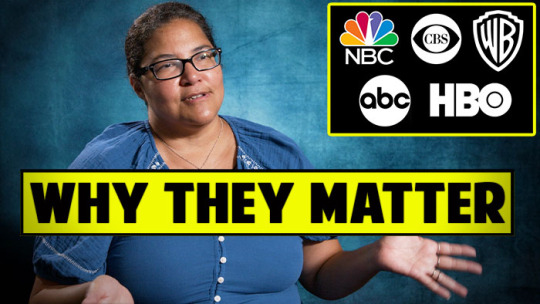
7 Key Benefits Of TV Writing Programs - Niceole R. Levy

#tv#television#tv writers room#film and tv#screenwriting#women in film#scriptwriting#writers on tumblr#tumblr writing society#screenwriters on tumblr#entertainment industry#writing for television
2 notes
·
View notes
Text
I was on a plane this weekend, and I was chatting with the woman sitting next to me about an upcoming writer’s strike. “Do you really think you’re mistreated?” she asked me.
That’s not the issue at stake here. Let me tell you a little something about “minirooms.”
Minirooms are a way of television writing that is becoming more common. Basically, the studio will hire a small group of writers, 3-6 or so, and employ them for just a few weeks. In those few weeks (six weeks seem to be common), they have to hurriedly figure out as much about the show as they can -- characters, plots, outlines for episodes. Then at the end of the six weeks, all the writers are fired except for the showrunner, who has to write the entire series themselves based on the outlines.
This is not a widespread practice, but it has become more common over the past couple of years. Studios like it because instead of paying for a full room for the full length of the show, they just pay a handful of writers for a fraction of the show. It’s not a huge problem now, but the WGA only gets the chance to make rules every three years -- if we let this go for another three years and it becomes the norm? That would be DEVASTATING for the tv writing profession.
Do I feel like I’m mistreated? No. I LOVE my job! But in a world of minirooms, there is no place for someone like me -- a mid-level writer who makes a decent living working on someone else’s show (I’d like to be a showrunner someday, but for now I feel like I still have a lot to learn, and my husband and I are trying to start a family so I like not being support rather than the leader for now). In a miniroom, there are only two levels -- the handful of glorified idea people who are already scrambling to find their next show because you can’t make a decent living off of one six-week job (and since there are fewer people per room, there are fewer jobs overall, even at the six-week amount), and the overworked, stressed as fuck showrunner who is going to have to write the entire thing themselves. Besides being bad for me making a living, I also just think it’s plain bad for television as an art form -- what I like about TV is how adaptable it is, how a whole group of people come together to tell a story better than what any of them could do on their own. Plus the showrunner can’t do their best work under all of that pressure, episode after episode, back to back. Minirooms just...fucking suck.
The WGA is proposing two things to fix this -- a rule that writers have to be employed for the entire show, and a rule tying the number of writers in the room to the number of episodes you have per season. I don’t think it’s unreasonable. It’s the way shows have run since the advent of television. It’s only in the last couple of years that this has become a new thing. It’s exploitative. It squeezes out everyone except showrunners and people who have the financial means to work only a few months a year. It makes television worse. And that is the issue in this strike that means everything to me, and that is why I voted yes on the strike authorization vote.
50K notes
·
View notes
Text
Like, yes, shows do get cancelled without warning, but that's not always – or even usually – why serialised media fails to stick the ending. Sometimes they never had a plan to begin with. Sometimes they know darn well how much screen time they have to work with, and they choose to front-load the show with decompressed character pieces anyway, then speed-run resolving the actual plot in the last two or three episodes, gambling that viewers will forgive them on the strength of their character writing. Sometimes it even works!
3K notes
·
View notes
Text
I feel like the issue of female characters being portrayed as weak/vulnerable has been overcorrected in mainstream media. Nowadays, "tough badass female character" has been turned into a boring stereotype, and now those characters can barely have any vulnerable moments and inevitably create marry sues now. Sorry, I don't want the female leads only personality traits as being badass and/or tough. I want her to have human emotion.
#writing#female characters#writers#writer#write#tv#television#movies#movie#gaming#characters#writer thoughts
776 notes
·
View notes
Photo

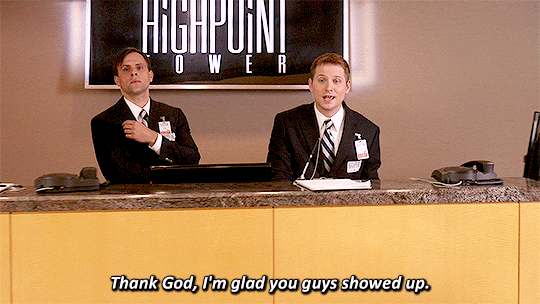
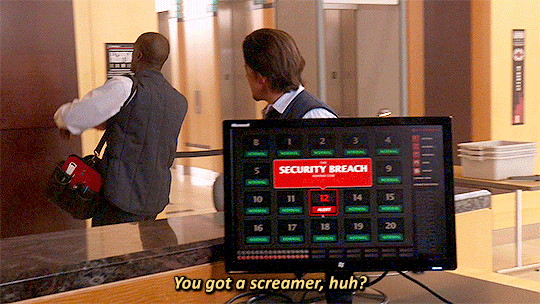
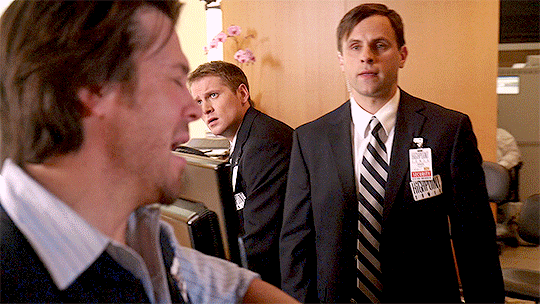


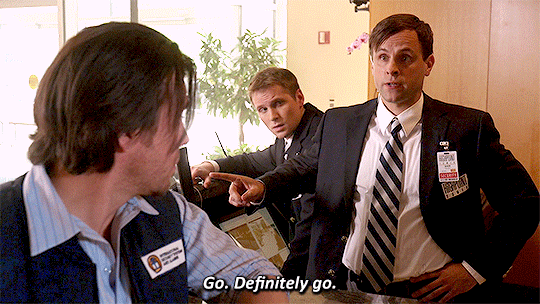
"They are looking for help and this is part of the research we do on the show. It’s like, where are the vulnerabilities in modern society and it’s the fact that you rely on the people you expect to fix things."
"I like how you’re teaching people how to rob buildings."
"Yeah exactly, why not! Fight the power."
- John Rogers and Aldis Hodge, The Long Goodbye Job DVD Commentary
#leverage#leverageedit#levcom#mine:photoset#eliot spencer#alec hardison#john 'down with capitalism' rogers please write more television thank you
6K notes
·
View notes
Text
As a writer, the thought of being paid $260 for helping write a show that has over 12.8 billion minutes viewed is sickening. The writers strike is absolutely crucial for the future of script writing, I can’t see anyone in this generation wanting to work for so little when the workload and potential payout is so massive
#suits tv#writerscommunity#writers strike#hollywood#suits#netflix#television#movies#scriptwriting#writing#creative writing#film#script#theater#university#college#english major#writers guild of america#wga strike#wga solidarity
880 notes
·
View notes
Text
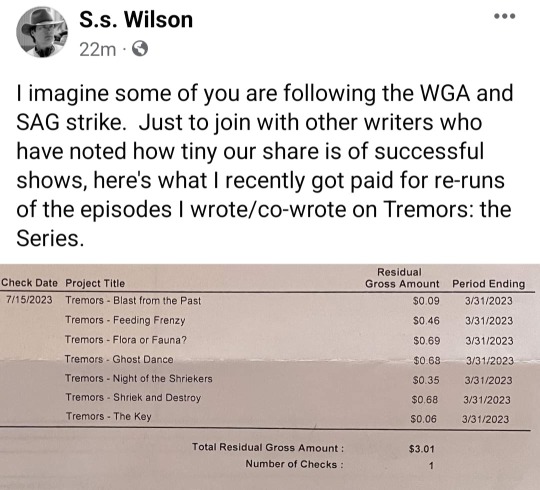
#wga strike#writers strike#sag strike#actors strike#hollywood#movies#tv shows#tv series#tv#television#tremorstheseries#tremors the series#stampedetremors#restorethetremorssaga#tremors#writing#writers on tumblr#writerscommunity#film#scifiseries#scifi
405 notes
·
View notes
Text
I need people to understand how S&P (standards and practices) works in television and how much influence they have over what gets to stay IN an episode of a show and how the big time network execs are the ones holding the purse strings and making final decisions on a show's content, not the writers / showrunners / creatives involved.
So many creators have shared S&P notes over the years of the wild and nonsensical things networks wanted them to omit / change / forbid. Most famously on tumblr, I've seen it so many times, is the notes from Gravity Falls. But here's a post compiling a bunch of particularly bad ones from various networks too. Do you see the things they're asking to be changed / cut ?
Now imagine, anything you want to get into your show and actually air has to get through S&P and the network execs. A lot of creators have had to resort to underhanded methods. A lot of creators have had to relegate things to subtext and innuendo and scenes that are "open to interpretation" instead of explicit in meaning. Things have had to be coded and symbolized. And they're relying on their audience to be good readers, good at media literacy, to notice and get it. This stuff isn't the ramblings of conspiracy theorists, it's the true practices creatives have had to use to be able to tell diverse stories for ages. The Hays Code is pretty well known, it exists because of censorship. It was a way to symbolize certain things and get past censors.
Queercoding, in particular, has been used for ages in both visual media and literature do signal to queer audiences that yes, this character is one of us, but no, we can't be explicit about it because TPTB won't allow it. It's a wink-wink, nudge-nudge to those in the know. It's the deliberate use of certain queer imagery / clothing / mannerisms / phrases / references to other queer media / subtle glances and lingering touches. Things that offer plausible deniability and can be explained away or go unnoticed by straight audiences to get past those network censors. But that queer viewers WILL (hopefully) pick up on.
Because, unfortunately, still to this day, a lot of antiquated network execs don't think queer narratives are profitable. They don't think they'll appeal to general audiences, because that's what matters, whatever appeals to most of the audience demographic so they can keep watching and keep making the network more money. The networks don't care about telling good stories! Most of them are old white cishet business men, not creatives. They don't care about character arcs and what will make fans happy. They don't care about storytelling. What they care about is profit and they're basing their ideas of what's profitable on what they believe is the predominate target demographic, usually white cis heterosexual audiences.
So, imagine a show that started airing in the early 2000s. Imagine a show where the two main characters are based on two characters from a famous Beat Generation novel, where one of the characters is queer! based on a real like bisexual man! The creator is aware of this, most definitely. And sure, it's 2005, there's no way they were thinking of making that explicit about Dean in the text because it just wouldn't fly back then to have a main character be queer. But! it's made subtext. And there are nods to that queerness placed in the text. Things that are open to interpretation. Things that are drenched in metaphor (looking at you 1x06 Skin "I know I'm a freak" "maybe this thing was born human but was different...hated. Until he learned to become someone else.") Things that are blink-and-you-miss-it and left to plausible deniability (things like seemingly spending an hour in the men's bathroom, or always reacting a little vulnerable and awkward when you're clocked instead of laughing it off and making a homophobic joke abt it)
And then, years later there's a ship! It's popular and at first the writers aren't really seriously thinking about it but they'll throw the fans a bone here and there. Then, some writers do get on the destiel train and start actively writing scenes for them that are suggestive. And only a fraction of what they write actually makes it into the text. So many lines left on the cutting room floor: i love past you. i forgive you i love you. i lost cas and it damn near broke me. spread cas's ashes alone. of course i wanted you to stay. if cas were here. -- etc. Everything cut was not cut by the writers! Why would a writer write something to then sabotage their own story and cut it? No, these are things that didn't make it past the network. Somewhere a note was made maybe "too gay" or "don't feed the shippers" or simply "no destiel."
So, "no destiel." That's pretty clearly the message we got from the CW for years. "No destiel. Destiel will alienate our general audience. Two of our main characters being queer? And in a relationship? No way." So what can the pro-destiel creatives involved do, if the network is saying no? What can the writers do if most of their explicit destiel (or queer dean) lines / moments are getting cut? Relegate things to subtext. Make jokes that straight people can wave off but queer people can read into. Make costuming and set design choices that the hardcore fans who are already looking will notice while the general audience and the out-of-touch network execs won't blink and eye at (I'm looking at you Jerry and your lamps and disappearing second nightstands and your gay flamingo bar!)
And then, when the audience asks, "is destiel real? is this proof of destiel?" what can the creatives do but deny? Yes, it hurts, to be told "No no I don't know what you're talking about. There's no destiel in supernatural" a la "there is no war in Ba Sing Se" but! if the network said "no destiel!" and you and your creative team have been working to keep putting destiel in the subtext of the narrative in a way that will get past censors, you can't just go "Yes, actually, all that subtext and symbolism you're picking up, yea it's because destiel is actually in the narrative."
But, there's a BIG difference between actively putting queer themes and subtext into the narrative and then saying it's not there (but it is! and the audience sees it!) versus NOT putting any queer content into the text but SAYING it is there to entice queer fans to continue watching. The latter, is textbook queerbaiting. The former? Is not. The former is the tactics so many creatives have had to use for years, decades, centuries, to get past censorship and signal to those in the know that yea, characters like you are here, they exist in this story.
Were the spn writers perfect? No, absolutely not. And I don't think every instance of queer content was a secret signal. Some stuff, depending on the writer, might've been a period-typical gay joke. These writers are flawed. But it's no secret that there were pro-destiel writers in the writing room throughout the years, and that efforts were made to make it explicitly canon (the market research!)
So no, the writers weren't ever perfect or a homogeneous entity. But they definitely were fighting an uphill battle constantly for 15 yrs against S&P and network execs with antiquated ideas of what's profitable / appealing.
Spn even called out the networks before, on the show, using a silly example of complaints abt the lighting of the show and how dark the early seasons were. Brightening the later seasons wasn't a creative choice, but a network choice. And if the networks can complain abt and change something as trivial as the lighting of a show, they definitely are having a hand in influencing the content of the show, especially queer content.
Even in s15, (seasons fifteen!!!) Misha has said he worried Castiel's confession would not air. In 2020!!! And Jensen recorded that scene on his personal phone! Why? Sure, for the memories. But also, I do not doubt for a second that part of it was for insurance, should the scene mysteriously disappear completely. We've seen the finale script. We've seen the omitted omitted omitted scenes. We all saw how they hacked the confession scene to bits. The weird cuts and close-ups. That's not the writers doing. That's likely not even the editors (willingly). That's orders from on high. All of the fuckery we saw in s15 reeks of network interference. Writers are not trying to sabotage their own stories, believe me.
Anyways, TLDR: Networks have a lot more power than many think and they get final say in what makes it to air. And for years creative teams have had to find ways to get past network censorship if they want "banned" or "unapproved" "unprofitable" "unwanted" content to make it into the show. That means relying on techniques like symbolism, subtext, and queercoding, and then shutting up about it. Denying its there, saying it's all "open to interpretation" all while they continue to put that open to interpretation content into the show. And that's not queerbaiting, as frustrating as it might be for queer audiences to be told that what they're seeing isn't there, it's still not queerbaiting. Queerbaiting is a marketing technique to draw in queer fans by baiting them with the promise of queer content and then having no queer content in said media. But if you are picking up on queer themes / subtext / symbolism / coding that is in front of your face IN the text, that's not queerbaiting. It's there, covertly, for you, because someone higher up didn't want it to be there explicitly or at all.
#long post#LONG-ass post#but it needed to be said!#i'm sorry if you think every creative involved with spn was a braindead asshole but the thing is.#even the most mediocre of writers understands a thing or two abt symbolism and writers working in TV are plagued by S&P#countless writers have talked abt the S&P bullshit and having to tweak and edit down their work to get past censors#it's a reality of writing for television#and the people who understand all this and understand the context of making TV in the early 2000s (to present tbh!) aren't 'delusional'#i'm sorry but it's naive to think that queer stories and queer characters are free to be told even nowadays. it's still a constant battle#times have changed but unfortunately not as much as you'd think#the confession !!!!! the confession still struggled to air and what we got was so obviously hacked down to bits!!!!!!#how can anyone think getting destiel content into the show was ever easy?#how can anyone think the pro-destiel writers weren't constantly having to be careful and underhanded in their writing?#there's a reason queercoding and subtext exist and it's this!!! it's censorship from TPTB#anyways. people much older than me have been talking abt this for ages. younger fans who are used to more open queer rep need to understand#it hasn't always been that easy and even nowadays SO many networks are still not willing to take a risk on queer stories#so creators do what they can#vic.txt
314 notes
·
View notes
Text
In the 2010s you really had big Hollywood creators declaring shit like "planning is the enemy of creativity" and "themes are for eighth-grade book reports" and being treated like maverick geniuses for it. Then when their work turned south and they went "wow, turns out plans and themes are important, who knew haha" everyone went "oh yes, well obviously that was dumb, we knew that the whole time"
162 notes
·
View notes
Text
Thoughts on the NBC Writers Program after applying this year.
1. I didn't know that it seems to be more for established TV writers until I saw the class chosen this year. Most of them have written for shows before (some even for NBC shows), and I think that may be one of the deciding factors? That's a good thing to learn, because it does stress the need for writers to do their own work, because there's almost no other way into the industry. But I do wish it was really for NEW, unestablished writers because, again, it's incredibly difficult to break into the industry without some sort of connection or doing like... tons of your own work and hoping it gets noticed.
2. I think my pilot did pretty well, because it boosted my Coverfly score. Which is really cool to see. I think everyone who wants to become a TV writer (although I want animation more), should try things like this. If nothing else, it's a confidence boost to see your work get even some level of appreciation against thousands of submissions. Again, it will be hard to compete against more established writers because I think their experience sets them apart, but the submission itself is worth trying.
3. I think there are probably better fellowships and writers programs for newer writers like me, like Nickelodeon (if that one still happens), so I probably should have tried one of those, first. I'm not talking about competitions, though those can be good to enter, too, but the fellowships through studios and networks (NBC, Disney, etc). My main interest in these is because they do give you a faster, easier track to actually writing for television. (Though usually on someone else's show, and usually just on the team, so you may not even be doing actual writing work at first.) A lot of people also suggest writing plays and producing them, because apparently TV likes getting playwrights.
Overall, I'm happy I submitted, though I'm a little disappointed to see that it's all established writers (albeit still newer, but some of them have writing credits I could only dream of!) It does seem to be a diverse group, though!
#writer stuff#writing for television#the Netflix animation thing was really cool until they basically gutted their animation department#i literally wrote a pilot FOR the Netflix Animation fellowship right before the fallout#writing
0 notes
Text
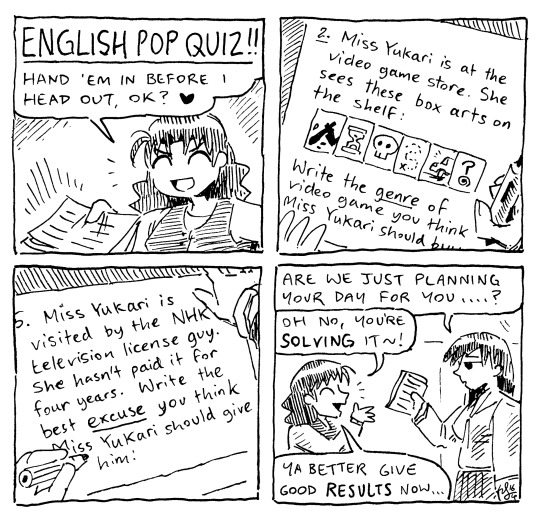
yukari's further quizzical adventures
#azumanga daioh#yukari tanizaki#sakaki#video game store#nhk television license guy#it's unfair how fun yukari comix are to write LOL#comic#wlart#williamleonard
1K notes
·
View notes
Text
Hi all! You may have heard there might be a writer’s strike soon. The reason for this is that every three years, the Writer’s Guild (which represents basically every television and movie writer) negotiates with the studios and networks (collectively called the AMPTP) to hash out an agreement of what guidelines the AMPTP have to follow if they want to hire a Writer’s Guild writer. If they can’t make an agreement by the time the contract from three years ago expires, which is on May 1, then no one will be able to employ a Writer’s Guild writer until a new contract is reached. That’s what a strike is. I don’t know if one will happen or not. Everyone, including the writers, deeply hope we’re able to make an agreement before May 1 and everyone will keep working. That being said, our last contract expired right at the start of the pandemic and everyone involved just kind of said “hey everything is weird right now so let’s not fight” so essentially we’ve got six years’ worth of grievances to talk about -- that is why this one seems especially contentious.
So that’s the background. The WGA and the AMPTP started negotiations this week. This is expected to continue throughout April -- no one expects to know either way until the end of April. Something very important I want everyone on Tumblr to know -- while negotiations are happening, the WGA has committed to a complete media blackout. No member of WGA leadership or the negotiating committee will be speaking about how things are going to the media. This means that if you see an article talking about the WGA’s position, whoever gave them that information is not talking for us -- and, since this is a two-sided negotiation we’re talking about, are probably talking directly against us. Use critical thinking on any negotiation-related articles you read -- does what they’re saying make sense? Who benefits from saying this?
Why am I saying this now? Well, yesterday, Variety published an article claiming that the Writer’s Guild is advocating for the use of AI. The article was full of twisted facts and confused falsehoods. The article took the WGA’s position that you can’t replace credited writers with AI and touted it as “the WGA is okay with AI as long as writers are credited!” That is an extremely bad-faith twisting of our position.The WGA had to issue a clarification of our position on twitter and now I’ve seen articles taking bits of THAT out of context -- specifically a Gizmodo article that implies that the Guild wants to take advantage of AI because it can’t be copyrighted, but their proof of that is a snippet from a section saying the reason we’re CONCERNED about AI writing is that it can’t be copyrighted.
And just, like....think about this for a second. Why on Earth would the Writer’s Guild WANT to replace writers with AI? Literally the organization whose entire purpose is to protect writing as a job? There’s no organization on Earth who would be opposed to it more. Every meeting I’ve been in has been unequivocally clear. WE ARE AGAINST AI. The second tweet in the thread I linked above says it outright: “AI can’t be used as source material, to create MBA-covered writing or rewrite MBA-covered work...”
It just seems to me like it would suck if we do head into a strike in May, and everyone is pissed off at us because they believe we are striking for something that is the EXACT OPPOSITE of what we want.
The WGA is in a media blackout. Be very skeptical of anything you read claiming to represent our position unless it comes from an official WGA source, like the one I linked above.
2K notes
·
View notes
Text
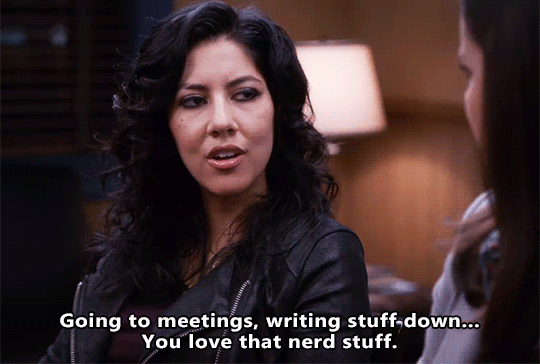


Brooklyn Nine-Nine
#b99#brooklyn 99#brooklyn nine nine#stephanie beatriz#rosa diaz#melissa fumero#amy santiago#nerd#nerdy#nerd stuff#cool person#writing#writing things down#funny#comedy#hilarious#humor#gif#gifset#television#tv#tv show#tv series
647 notes
·
View notes
Text
Memory Reboot - A One-Sided Radiostatic One-Shot (Vox x Alastor)
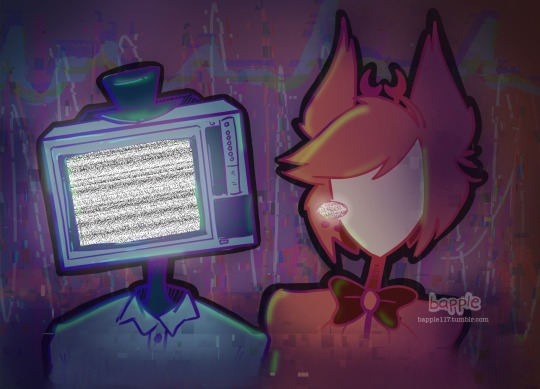
Third person - Fluff, Pining, Angst - mild adult references
~ A03 Link ~ text is also included below after the break ~ excuse the crappy art ~
Summary: Every now and then, Vox allows himself a trip down memory lane; back to when he and Alastor were good friends. This night, Vox rediscovers an old bit of memorabilia that has him reminiscing, all about one night when he and the Radio Demon shared a drink or two. The memory is a bittersweet reminder of what could have been, and what almost happened; lips meeting for the sweetest of stolen moments.
---------------------------------
Vox stumbles into his room, clumsy and heavy with drink. He bashes his head into the door as it rebounds; groaning, he rubs at his screen with a grimace.
Drinking alone is always a bad idea. With the other two Vees both out for the night, Vox had allowed himself a little more stalking than he usually does; drinking in his surveillance room, watching and rewatching clips of the Radio Demon going about his day. It’s obsessive; Vox knows it is. He still can’t help himself.
He teeters wildly on his legs now, looking through his belongings for some painkillers for the inevitable screen-ache he’ll have in the morning; where the fuck are they?!
Not a single drawer he searches yields any results. Vox tosses items left and right, searching through masses of cables and piles of clothes. He rifles through his bathroom cabinet, knocking down an assortment of pill bottles in the process; none of them what he needs right now.
“Fuck my life,” the Television Demon mutters to himself.
On his hands and knees, he pulls out a bottom drawer from a huge dresser. Vox moves sloppily with inebriation as he pilfers through all the junk and bric-a-brac. And then - his hand is on something that feels familiar yet forgotten all at once. Vox pulls it out; and there it is.
His electric heart shudders within his chest.
The tiny die-cast CRT TV model that Alastor had gifted to him years ago. So many years ago. So long ago, in-fact, that when Alastor had presented Vox with this small model, it had been exactly what Vox’s own head had looked like. A chunky, heavy, 70s television. Long outdated technology, these days, of course; Vox has upgraded several times over the years since then.
Vox can hardly believe his tired eyes; it’s been years since he thought about this. He remembers the night Alastor gave it to him all too well - too painfully well. Vox sighs; his sadness threatening to leak into the forefront of his drink-weakened mind.
The search for the painkillers now given up on and forgotten, Vox crawls to his bed and lays on it in the dark, the small metal totem still in his hand. Neon lights from the city outside dance and skitter on the walls. Vox stares at the ceiling.
He can’t help himself; the memory begins to play in his mind, like an old VHS recording, discovered and dusty. Vox usually represses these memories, but for some reason, he allows this one to consume his thoughts this night. He drifts off into it; a broken heart indulging itself despite the pain.
---------------------------------
It’s the past. Long, long ago; some time in the 1970s. Vox is drinking with Alastor - the Radio Demon, his friend. They are drinking together in Alastor’s old apartment, sharing each other’s company in the easy way that they used to. The apartment is full of antique furniture and vintage radio paraphernalia; Vox has been here many times, and yet he always eyes Alastor’s decor with the same dry observations.
“You really need to get with the times, Al,” Vox says. “Get some more modern stuff.”
The Television Demon gawks at himself in an ornate mirror on the wall; his on-screen features blink back at him, set in his wide CRT TV head.
“Nonsense,” Alastor calls from the kitchen. “There’s nothing wrong with my decor choices. Some things never go out of style.”
Vox huffs in amusement to himself. Secretly, he adores Alastor’s presentation. Vox looks up to the Radio Demon; he admires him. Vox wants to be just like Alastor, really. Powerful, respected, smart, classy. Alastor is everything Vox wants to be. At this point in time, Vox is a much weaker Overlord than Alastor, having only been in Hell for less than twenty years. It’s never an issue between them, of course, but Vox knows he is inferior. One day, he’ll be better.
The Television Demon joins his friend in the kitchen then; Alastor is pouring new glasses of drink for them. Something expensive.
“Woah,” Vox says, laughing. “What are we celebrating?”
“Well, I was wondering when you’d ask,” Alastor says sassily. “I took down another one of my rivals today.”
Vox blinks. His screen buzzes.
“Another Overlord?” He asks, both impressed and appalled.
Alastor nods, pleased.
“Don’t look so surprised,” Alastor says, grinning. “It was no effort at all, really. Hardly worth you looking so gormless over. What fun it was though!”
Vox laughs nervously.
“Well, uh, that’s great, Al!” He says, accepting the drink. “You gotta promise not to ever try and take me down like that though, huh?”
It’s a weak joke; both demons know that it stinks of a true fear. Alastor scoffs.
“Don’t be ridiculous, Vox,” the Radio Demon says. “How long have we known each other now, hmm?”
Vox scans his memories to try and answer accurately.
“Uhhh… Well years,” he says. “Almost two decades.”
“Exactly. And have I ever once betrayed you?” Alastor asks, gesturing for them to sit at the table.
Vox follows Alastor’s lead and sits.
“I guess not,” Vox says.
The two demons sit in silence for a while; which is odd, given how prone to idle conversation they both usually are. Alastor hums along to a jazz tune playing in the background; Vox fiddles with his glass.
Alastor is deep in contented thought; eyes closed, a red claw tapping at the table to the rhythm of the song. Vox takes a gulp of his drink, still not knowing what it is; his question is answered as soon as it hits his throat. Some kind of very strong spiced rum, neat on ice. The Television Demon coughs a little, white noise filling the silence. Alastor grins.
Vox looks up at his friend then; sees his smile. His own grin creeps up on to his screen. How simple it is between them; how easy it’s always been. Just the two of them. Alastor doesn’t have many friends; Vox is honoured to be one of them. Friends. Vox wishes they were so much more.
“You know,” Vox says then, staring at his drink. “We could be something. Together, I mean.”
Alastor’s neck snaps a little as his head twitches to the side in confusion.
“Something?”
Vox hastens to clarify.
“You know. A team. Take down Overlords together,” he says.
Alastor seems to genuinely consider this for a moment; he drifts away into the thought of it. Vox lets himself hope for a second; his hopes are dashed just as quickly.
“Hmm,” Alastor says. “You know me, though! I prefer to work solo.”
Vox slumps a little. His work shirt sleeves are rolled up messily; one begins to loosen from its turn-up, so he focuses on re-rolling it.
“I know,” he says. “Doesn’t it ever get lonely, though?”
“I don’t think so,” Alastor says, amused.
“Oh.”
The Radio Demon ponders this for a beat longer; he senses he has insulted his friend somehow. This is meant to be a nice evening celebrating his latest victory; Alastor supposes he should show a little courtesy to keep things jovial.
“I suppose it does, sometimes,” Alastor says.
Vox feels his inner wiring twisting in his abdomen.
“Oh?”
Alastor rolls his eyes; must he elaborate?
“Well, I suppose having more allies couldn’t hurt,” he says.
“Oh, well,” Vox says. “I could… I could be that for you?”
Alastor grins.
“In your current state, I feel you may not be of any use to me, Vox old pal,” Alastor teases. “Come back to me when you’re stronger, hmm?”
The Radio Demon knocks playfully on the side of Vox’s clunky CRT head; it echoes within him. Vox knows that Alastor only means this as a cheeky gibe between friends; it wounds him all the same.
Vox lets out a nervous laugh as response and tries to conceal the hurt.
The night is salvaged somewhat; the two demons continue to drink into the early hours. They chat, they listen to music, they share stories about various occurrences in Hell. Despite the fact they are undying souls in burning eternity, they are also both something else; two beings who both died as young men, now frozen in time.
Alastor isn’t who he’ll truly be just yet; neither is Vox. In this memory, they are their younger, slightly sweeter selves. It’s enough to make present-day Vox cry with how much he’d give anything to have those days back.
Towards the end of the night, the two demons sit side by side together, wasted. They use the sofa as a backrest as they sit sloppily on the floor. Vox hiccups and it sounds like a channel being changed; Alastor laughs.
“You know,” the Radio Demon starts. “I do enjoy these little chats of ours, despite our conflicting technology.”
Vox is giddy; he nods, eager.
“One day I’m gonna be great, Al,” Vox says, suddenly. “I’m gonna build an empire. It’s gonna be huge.”
Alastor smiles; it’s the soft, fond smile of a friend humouring someone.
“Is that so?”
“Yeah,” Vox says, slurring slightly. “And I’ll be as strong as you - no! - even stronger.”
Alastor is laughing; genuine and warm. Vox grins wide at the sound of it.
“I’ll take over all of Hell!” Vox says, clenching a fist.
Alastor chuckles.
“Hm. That sounds nice,” he says, drunk and feeling it.
“Well,” Vox starts. “You’ll be there with me, right?”
Alastor quirks his head.
“Will I?”
“Sure! We’ll do it together,” Vox says, wicked intent on his screened features. “We’ll rule Hell together. No fucker will cross us with our combined skills.”
Alastor is giggling; Vox wants to climb into the sound of it and live there.
“Well, that is a lofty concept, to be sure,” Alastor says. “But it is pleasing, I have to admit. You truly do get some devious ideas don’t you?”
“Fuck yeah I do!” Vox says, delighted.
Alastor smiles to himself, looking away.
“Well, if that ever comes to fruition, you can count on me being there,” he says.
“Yeah?!” Vox is beaming. “I can’t wait for what the future brings, Al. This old thing will be the first to get an upgrade, that’s for sure.”
Vox taps his own head; even now in the late 70s, his TV set head is looking a bit vintage. Vox just needs to wait for Earth technology to advance and filter down; he can’t wait to be better. Stronger. Faster. Alastor tenses as a thought seems to come to him.
“That reminds me!” The Radio Demon says. “I have something for you.”
Alastor retrieves something from his pocket and hands it to a captivated Vox; it's a tiny metal die-cast model of a Sony Triniton KV-1820UB television set. It looks just like Vox’s current head.
“Here you are,” Alastor says, pleased with himself.
Vox is enamoured; the Radio Demon doesn’t do gifts. This is special; it means Vox is special.
“Al, I don’t know what to say,” Vox says, his nerves alive and crackling. “I can’t believe you got this for me… I love it.”
Alastor grins wide.
“I got one for me, too,” he says, holding up a tiny model of an old radio. “I found a charming boutique selling all kinds of little novelties. Aren’t they fun?”
Vox is astonished; not only did Alastor get him a gift, he got one for himself to match. This surely is symbolic? Vox’s receivers are scrabbling to interpret the signals Alastor is giving off.
“Wow, yeah, that’s uh… That’s cute, Al,” Vox says, shakily. “It’s not like you to give gifts.”
Alastor laughs.
“Well. My conquest today put me in an especially good mood, I suppose,” he says.
Vox nods.
“Thank you, Al,” he says, screen blinking. “I will treasure this. I mean it.”
Alastor’s quota for sincerity has reached its limit; eager to return the conversation to playful jibes and gossip, the Radio Demon scoffs. Vox grins; he knows Alastor hates to be perceived as kind, despite the fact he can be. Vox shoves himself into Alastor’s shoulder in a playful bump.
“You’re goin’ soft on me, old man,” Vox jokes; Alastor pretends to be aghast.
“Old man?” He scorns. “How dare you, Vox. I only died two decades before you and we were both more or less the same age at death. Watch your tongue.”
Vox chuckles to himself. The two demons sit together for a little while longer in peaceful quiet; Vox’s mind is full of static. He’s processing, thinking. Vox has tried to broach this topic before, but he can’t help himself; he needs to push it again.
“Hey, uh, Al?” He says.
Alastor looks at him and hums an acknowledgement. Vox’s gaze shifts around nervously.
“Do you remember that… conversation, we had a while ago?” Vox says.
Alastor does remember; he pretends for now that he doesn’t. He shakes his head. Vox exhales shakily.
“Look, I, uh… I know you don’t like talking about… feelings, and stuff, but…”
Alastor wants this nipped in the bud as soon as possible.
“Is this about your infatuation, hmm?” The Radio Demon says, trying to sound casual about it. “I’ve told you Vox. It will pass, it’s just a-“
“No,” Vox says, urgent. “It won’t, Al, and you know it.”
Vox grabs Alastor’s hand; the Radio Demon doesn’t recoil. He lets his claws sit limply within Vox’s; a tiny concession for this display of vulnerability. And anyway; they’ve linked hands before, when dancing or fleeing a crime scene, or such. No big deal. Alastor sighs.
“You know I can’t give you want you want,” he says, radio filter slipping away. “This is all I can give you. My time. My friendship, my consort to you as a fellow Overlord.”
Vox is exasperated.
“Can’t you give me just a little bit more?” He asks.
Alastor avoids the Television Demon’s gaze.
“I don’t think so,” he says.
Vox grabs Alastor’s chin in his, then; pulling it in his direction to make Alastor look at him.
“How do you know you won’t like it?” Vox says. “You’ve never even tried it.”
Alastor blushes at the sudden contact, the intrusiveness of it. He’s flustered simply because Vox is being so forward; any sign of aggressive intent is entertaining to Alastor, of course.
“Why don’t you let me just try?” Vox says, his voice a thin whine.
“Vox, old friend, come on now-“
“Why won’t you let me just kiss you?” Vox whispers. “Please, Al.”
Alastor hesitates; if he relents, will it be enough to just shut Vox up about this once and for all? This topic cropping up every couple of years is getting tiresome. And... he does care about Vox. Alastor loves him, in his own way; platonic but true.
“Please, Al,” Vox murmurs, his eyes fixed on Alastor’s lips. “I’m begging you. I know it’ll feel right when it happens.”
Vox’s hand tightens around Alastor’s chin; he’s trying to pull him inwards. Alastor’s heart rate quickens; annoyingly. He’s a deer in headlights; drunk and unsure how to retaliate. Vox is closing the distance between their faces; Alastor can feel their hot breath exchanging in the small gap between their mouths.
Alastor’s ears are flat against his head; Vox is staring at his lips.
“Please,” he whispers again.
“I don’t… I don’t know,” Alastor whispers back.
“Please,” Vox begs, desperate.
Alastor huffs in defeat, and Vox knows he has won. Vox leans in and presses his screen to Alastor’s mouth; for a moment, the Radio Demon is rigid. But then… his mouth is moving; Vox is elated. Alastor is relenting. Vox cannot believe it. Alastor is kissing him back; his hand at the edge of Vox’s screen. Their mouths move together quickly, the taste of rum amongst it all. Vox's mind is awash with joy.
Yes, YES. Fucking YES! This is it, this is IT!
Vox moans into Alastor’s mouth; he risks letting his tongue breech Alastor’s lips, tries sticking it down Alastor’s throat -
Alastor pulls away; Vox is devastated. Too far.
“Hmm!” Alastor says, recovering, trying to sound light-hearted. “No, still not for me, I don’t think.”
Vox is panting, red in the screen. He’s hard; of course he is. Vox’s eyes dart all over Alastor, looking for signs - proof that he did like it.
“No, Al, come on,” Vox says. “Please, you know it works, WE work, c'maaan!”
Alastor is sad; a part of him does wish he could give Vox what he wants. It would make things so much easier; it would ensure keeping his loyalty, for one. And… well. It would make things a bit less lonely. But Alastor just can’t let himself go there.
“I’m sorry, Vox,” he says, genuinely melancholy. “I’m sorry I can’t give you what you want from me. I really am.”
“No,” Vox is angry. “It cannot be like this, please, we were so close-“
“I think it’s high time we went to bed, hmm?” Alastor says. “You’re in no state to get yourself home. You can sleep on the sofa.”
“Al, stop, just, can we talk about this? Can we try again, I��ll go slower, I promise,” Vox says, grasping at straws.
Alastor smiles weakly. He reaches up and turns one of Vox’s dials fondly; Vox’s erection twitches in his jeans.
“You’ve just had too much to drink, hmm?” Alastor says. “We’ll sleep this off and tomorrow it’ll all be forgotten about.”
Alastor stands then; Vox groans, his screen in his hands.
“We’ll be back to normal tomorrow, eh, old pal?” Alastor says with forced jollity.
Vox sighs; it’s guttural. He looks up at the Radio Demon, agonised.
“I’m never going to be back to normal,” Vox says. “I’m always going to want this. I’m always going to want you.”
Alastor hesitates; he looks forlorn. Only in the eyes, of course; but his smile is a tight, thin line on his face.
“I know," he says.
Vox's heart shatters in his chest; not for the first time.
"Do try to get over it, though, won’t you?” Alastor says, and he turns to leave for his bedroom. “Get some sleep.”
Vox is left alone in the living room; ruined.
---------------------------------
The memory of that night, so many decades ago, drifts away from present-day Vox, just as cruelly as Alastor had slipped from his grasp.
The pain of it - and indeed, remembering what came later - is unbearable; Vox can only cope with these memories now by wanting Alastor dead. Just so he’d be gone for good; just to rid himself of the pain of knowing Vox never got to keep him. He came close, of course; some years later, in the 80s. For a while, Vox had had Alastor; it had been so sweet. Vox doesn’t let himself think on this, for now. It’s too brutal. He’d be a mess; for now, he needs to compose himself. Vox places the die-cast vintage TV model on his bedside table and looks at it for a few beats.
I wonder if Alastor still has his radio model.
I wonder if he still thinks of me.
Vox curls into a ball in his bed; the truth hums around him, thick and heavy, like electricity in the air before a thunderstorm.
He’ll never love me like I love him.
He never did.
---------------------------------
This story continues in:
Bluest Monday
Read all my stuff on AO3 🍎
#bapple writes#one-shot#hazbin hotel fanficton#radiostatic one-shot#radiostatic#one-sided radiostatic#one sided radiostatic#radiosilence#staticradio#vox x alastor#alastor x vox#vox hazbin#alastor hazbin#hazbin one-shot#vox hazbin hotel#vox pining#radiostatic fanart#radiostatic fanfiction#radiostatic fanfic#the radio demon#the television demon#radio killed the video star#hazbin angst#hazbin fluff#hazbin one shot
86 notes
·
View notes
Text
Things I Loved About Fleabag (2016):
The careful balance of spiralling and sincerity that keeps you rooting for resolution and relief, despite the show intentionally framing itself around grief
The way that it is clear based on the way that they talk about her that Fleabag is a great deal like her mother (her off-colour jokes, her charisma, even hints of difficult friendships through the Godmother) but they don't have anyone make that comparison until the last episode of S2, with, "You are the way you are because of [your mother]" and the look of surprise on Fleabag's face when she hears it
"Don't make me an optimist; you will ruin my life," being such a telling line, because as you fall in love with the Priest, and Fleabag, you want to believe that things will work themselves out
The love in Claire's line to Fleabag, "The only person I'd run through an airport for is you," and the delightful contrary optimism of her deciding to go to the airport anyway
The revelation that Boo had offered to take Fleabag's love for her mother, intertwining both losses
The way that the Priest not only breaks through the carefully constructed narrative relationship that Fleabag has with the viewer, but also himself directly looks toward the audience on a separate beat as he tries to understand her more ("You don't like answering questions, do you?")
The entire sequence of the last few scenes, "Being a romantic takes a hell of a lot of hope," to "I love you." "It'll pass," to Fleabag walking around with a statue that is, in some ways now, a physical representation of the love she is carrying around. Because while the show is about grief, and love, it doesn't feel like it is asking you to overcome those things, but to learn to live with them while moving forward
#ayesha says things#fleabag#hot priest#priestbag#claire fleabag#fleabag series#television#more thoughts in tags#i'm glad i stuck it out bc the first few eps i was like 'i don't know if this is for me' and then as it continued i was like 'OH.'#i love how s1 feels like a complete story. and then s1-s2 feels like a more complete story#and i adore how you can see the love in its writing. it's like watching tgp. it feels intentional and sincere and a bit clever#also not to undercut the sincerity of my feelings for this show#but i wasn't expecting to find andrew scott's hot priest SO HOT. they really did something there. every time he was on screen i was like#I Am Looking 👁👄👁#alright 2010 sherIock fans. u win this round
114 notes
·
View notes